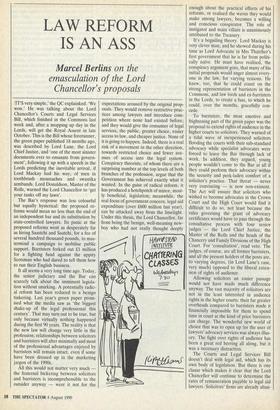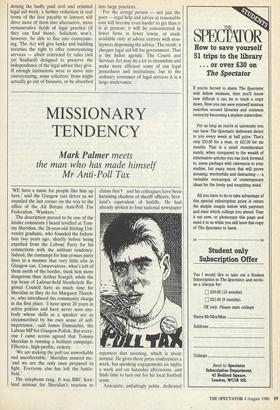LAW REFORM IS AN ASS
Marcel Berlins on the emasculation of the Lord Chancellor's proposals
'IT'S very simple,' the QC explainked. 'We won.' He was talking about the Lord Chancellor's Courts and Legal Services Bill, which finished in the Commons last week and, after a mopping up day in the Lords, will get the Royal Assent in late October. This is the Bill whose forerunner, the green paper published 18 months ago, was described by Lord Lane, the Lord Chief Justice, and 'one of the most sinister documents ever to emanate from govern- ment', following it up with a speech in the Lords predicting the inevitable arrival, if Lord Mackay had his way, of men in toothbrush moustaches and swastika armbands. Lord Donaldson, Master of the Rolls, warned the Lord Chancellor to 'get your tanks off my lawn'.
The Bar's response was less colourful but equally hysterical: the proposed re- forms would mean no less than the end of an independent bar and its substitution by state-controlled lawyers. Its panic at the proposed reforms went as desperately far as hiring Saastchi and Saatchi, for a fee of several hundred thousand pounds, to mas- termind a campaign to mobilise public support. Barristers forked out £1 million for a fighting fund against the uppity Scotsman who had dared to tell them how to run their English business.
It all seems a very long time ago. Today, the senior judiciary and the Bar can scarcely talk about the imminent legisla- tion without smirking. A potentially radic- al reform has been reduced to a benign tinkering. Last year's green paper prom- ised what the media saw as 'the biggest shake-up of the legal professional this century'. That may turn out to be true, but only because virtually nothing happened during the first 90 years. The reality is that the new law will change very little in the profession; relationships between solicitors and barristers will alter minimally and most of the professional advantages enjoyed by barristers will remain intact, even if some have been dressed up in the marketing jargon of the 1990s.
All this would not matter very much — the fraternal bickering between solicitors and barristers is incomprehensible to the outsider anyway — were it not for the expectations aroused by the original prop- osals. They would remove restrictive prac- tices among lawyers and introduce com- petition where none had existed before; and they would give the consumer of legal services, the public, greater choice, easier access to law, and cheaper justice. None of it is going to happen. Indeed, there is a real risk of a movement in the other direction, towards restricted choice and fewer ave- nues of access into the legal system. Conspiracy theorists, of whom there are a surprising number at the top levels of both branches of the profession, argue that the Government has achieved exactly what it wanted. In the guise of radical reform, it has produced a hotchpotch of minor, most- ly beneficial, legislation; meanwhile, the real focus of government concern, legal aid expenditure (over £600 million last year), can be attacked away from the limelight. Under this thesis, the Lord Chancellor, far from being the benign, well-meaning new- boy who had not really thought deeply enough about the practical effects of his reforms, or realised the waves they would make among lawyers, becomes a willing and conscious conspirator. The role of instigator and main villain is unanimously attributed to the Treasury.
It's a beguiling theory. Lord Mackay is very clever man; and he showed during his time as Lord Advocate in Mrs Thatcher's first government that he is far from politi- cally naïve. He must have realised, the conspiracy argument goes, that many of his initial proposals would anger almost every- one in the law, for varying reasons. He knew, too, that he could count on the strong representation of barristers in the Commons, and law lords and ex-barristers in the Lords, to create a fuss, to which he could, over the months, gracefully con- cede.
To barristers, the most emotive and frightening part of the green paper was the proposal to extend rights of audience in the higher courts to solicitors. They warned of a tidal wave of inexperienced solicitors flooding the courts with their sub-standard advocacy while specialist advocates were forced to leave the Bar through lack of work. In addition, they argued, young people wouldn't come to the Bar at all if they could perform their advocacy within the security and perk-laden comfort of a solicitor's practice. That threat — never very convincing — is now non-existent. The Act will ensure that solicitors who wished to become advocates in the Crown Court and the High Court would find it difficult to do so, not least because the rules governing the grant of advocacy certificates would have to pass through the consultative process with four senior judges — the Lord Chief Justice, the Master of the Rolls and the heads of the Chancery and Family Divisions of the High Court. For 'consultation', read veto. The judges, of course, are all former barristers, and all the present holders of the posts are, to varying degrees, (in Lord Lane's case, very much) opposed to the liberal exten- sion of rights of audience.
Allowing solicitors an easier passage would not have made much difference anyway. The vast majority of solicitors are not in the least interested in audience rights in the higher courts: their far greater overheads compared to barristers made it financially impossible for them to spend time in court at the kind of price barristers can charge. The wonderful new world of choice that was to open up for the user of lawyers' advocacy services was always illus- ory. The fight over rights of audience has been a great red herring all along, but it was a necessary distraction.
The Courts and Legal Services Bill doesn't deal with legal aid, which has its own body of legislation. But there is one clause which makes it clear that the Lord Chancellor will continue to determine the rates of remuneration payable to legal aid lawyers. Solicitors' firms are already aban- doning the badly paid civil and criminal legal aid work; a further reduction in real terms of the fees payable to lawyers will drive more of them into alternative, more remunerative fields of legal practice (if they can find them). Solicitors won't, however, be able to flee into conveyanc- ing. The Act will give banks and building societies the right to offer conveyancing services — albeit restricted by rules (not yet finalised) designed to preserve the independence of the legal advice they give. If enough institutions were to move into conveyancing, some solicitors' firms might actually go out of business, or be absorbed into large practices.
For the averge person — not just the poor — legal help and advice at reasonable cost will become even harder to get than it is at present; it will be concentrated in fewer firms in fewer towns, or made available only at advice centres with non- laywers dispensing the advice. The result: a cheaper legal aid bill for government. That is the hiden agenda. The Courts and Services Act may do a lot to streamline and make more efficient some of our legal procedures and institutions; but to the ordinary consumer of legal services it is a large irrelevance.

















































 Previous page
Previous page